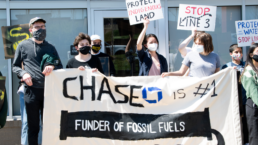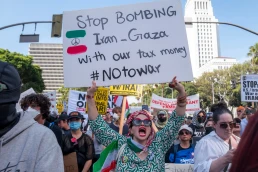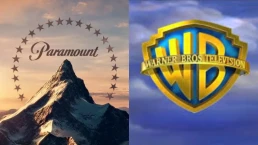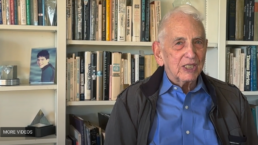“We have to be pretty opportunistic about the way that we intervene in certain places and recruit and build.”
By Matthew J. Haugen, Terrain
Nick (he/him) serves as a Staff Attorney at Breach Collective, providing legal and strategic support to grassroots partners around the country. Nick has significant experience in climate, energy, and air quality law and policy. He has a unique knowledge of municipal level strategies for restricting the activities of the fossil fuel industry, having been deeply involved in efforts to prohibit fossil fuel infrastructure in Portland and throughout the Pacific Northwest. Nick is also a member of Portland DSA and has been active in local movements to raise the minimum wage, establish new protections for renters, and secure greater accountability for the police.
This interview has been edited for content and clarity.

MH: Given the urgency of ecological crises, we really need to not have any new fossil fuel infrastructure and phase out what exists as soon as possible. And, at the same time, building new renewable energy; sometimes people take for granted that that’s the same thing. So how can we stop the fossil fuel industry? What are strategies to do that?
NC: The way I think about it is to turn the logic that the fossil fuel industry wants people to internalize on its head. Most of these projects—especially a new pipeline project or a new terminal project—the burdens are actually all on the company to go get all these permits that they have to get and, historically speaking, they feel like they’re rubber-stamped. So I think people get beat down and scared looking into the face of that. We can’t win, we don’t have the resources, they have all the resources, of course they’re going to get these permits. But it only takes one, sometimes, of those permits to not be granted for a project to not be allowed. So pairing that logic with a will to fight, those two things are integral for any campaign. If you can get that far, then you’ve got a fighting shot. I’ve seen this repeatedly in my activist and professional life: we’re not supposed to win, we’re super overmatched, we’re even sometimes late to the process, they’ve already gotten 80 or 90% of the things they need for the project, most people in the “big greens” have just given up or moved their resources elsewhere. And we’ve intervened and used the organizing techniques that we’ve developed over time and learned from our organizing forefathers and mothers and all the rest. It works.
What are some good examples that come to mind?
My favorite campaign that I’ve ever been involved in was actually in Memphis. In 2020, right as Breach Collective was getting started, we met these folks, the Memphis Community Against the Pipeline, who decided that they were going to stop a crude oil pipeline from going through a historically Black neighborhood in southwest Memphis. The pipeline company already had state permits granted and Army Corps nationwide permit 12 granted, and so they were late to it in that way.
We ended up getting to meet these fabulous community advocates in southwest Memphis who mobilized basically from zero to defeating a multibillion dollar pipeline within six or seven months with really, really good grassroots community building and working at city and state government, basically leveraging every possible advantage that they had toward the defeat of this pipeline. The story is incredible; it’s been covered a bunch of times now. There’s a podcast called The Sum of Us that just put out an episode that did a really good job.
It’s one of the most environmentally burdened communities I’ve ever seen, because there’s also legacies of industrial pollution nearby, people’s life-spans are much shorter, there’s high poverty. Just sheer willpower and organizing creativity busted up this oil company in seven months, and it’s the only example that I’ve ever been personally involved in where the company voluntarily withdrew its application for the project and didn’t have to be defeated.
What strategies or tactics do you feel were really successful in that fight?
I think geographical and political power mapping was really important. Whenever I do campaigning, whether it’s on the policy side or opposing a project, the first thing that I do is really intensive research into every law that’s available, every process that I can imagine, and just listing all that. So that was step number one, getting a really good understanding of what the lay of the land was. And then, along with that, seeing what permissions have already been granted, what state agencies have already given their assent to something, what needs still to be granted, where are the local or state governing bodies or utilities or anything that can be used as a leverage point if you could exercise sufficient pressure on them.
Recent Posts
As Security Council Stalls, There Are Other Ways to Stop U.S.-Israeli War on Iran
March 3, 2026
Take Action Now A “Uniting for Peace” resolution in the UN General Assembly can counter the Security Council’s failure to act.By Marjorie Cohn,…
States Can Block the Paramount-Warner Deal
March 3, 2026
Take Action Now But thanks to some clever maneuvering, they are already running out of time.By David Dayen, The American Prospect What started as…
Congress, Do Your Job and End This Illegal War of Aggression By The U.S. and Israel
March 2, 2026
Take Action Now Congress must assert its Constitutional authority over matters of war and peace against an out-of-control, rogue president and…
Daniel Ellsberg Speaks to Us as the War on Iran Continues
March 2, 2026
Take Action Now Ellsberg’s voice is back via a compelling new book. “Truth and Consequence,” being published this week, provides readers with his…




